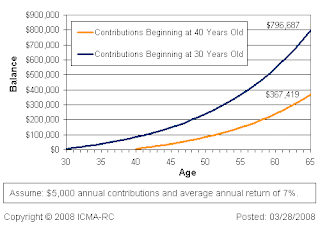* If you are below the age of 25 and reading this, i urge you to go and start investing little by little in your own choice of blue-chip stocks. Its not too late for your kids too, I suggest starting early for your kids. It's a study which i wish i discovered earlier because i had a "poor dad" using the definition by Robert Kiyosaki in his popular book "Rich Dad, Poor Dad". Unfortunately my father did not feel that his kids needed to learn about money, he only taught us to save, get a good job and save some more. Having a saving plan running concurrently with your investment plan is very important too, but as a rule, i never keep more than 8 months living expenses in my bank account.
Rule Number 2: Try Not to Lose Money
This may sound funny to some but i think we should have the mentality of not losing money unnecessarily. If we want to preserve our capital and eventually grow it, we must aim not to lose big money. I have noticed that most people do end up losing money through gambling, ridiculous investment schemes, poorly executed business deals, greed and often times poor market timing. Over the years, there have been so many cases in Singapore where people lost money in the stock market, options, futures, in terrible loans, mindless gambling and in their own business. This rule may be simple, but we have to be disciplined in the way we spend our money and perform due dilligence enterning into any kind of investment.
Rule Number 3: It takes Money to make Money
The wealthy investor has a major advantage over the smalltime amateur investor, they have the MONEY. One can argue that actually the wealthy investor does not need the market, somehow the market always moves in their favour. Understand the wealthy investor's mindset, he already has all the income he needs, not depending on the investment outcome, removing all emotions out of the equation. He probabaly has money invested in BONDS, Treasury-bills, Money market funds, Stocks, Real Estate and Other Business shareholdings.
The wealthy investor is an expert is seeing VALUE. For example, he would invest in Bonds when its cheap and yields are high or move his money to Stocks when they are cheap with higher yields. With the ultimate goal of acquiring REAL ASSETS, eventually these investors buy real estate, physical gold, jewellery, expensive watches, diamonds and artwork; Things with great value. Another thing is when there is no opportunity presenting itself, they can afford to wait. We need to have patience.
What about the little guy with little or no money? They feel pressurised to make money, or SAVE, SAVE, SAVE into a bank. This is madness at current interest rates less than 1%, being offered by banks. When the small investor is not buying overvalued stocks offerting 1-2% yields, he is off to gamble away his hard earned savings like buying lottery tickets or some ridiculous get-rich quick scheme. The small investor is always trying to force the market to do something for him, he is a guaranteed loser. Without understanding VALUES, he constantly overpays swayed by his/her emotions. I like this statement which i found on the internet : "He who understands interest - earns it. He who doesn't understand interest - pays it". The poor guy usually end up in huge debts, making payments on his house, electronic equipments (Thanks to COURTS easy installment plans), loses money gambling...in short always runs after money.
So why is it that life is unfair, wealthy people always have the upper hand? I thought the poor always maintain a strict discipline of never overspending. Instead of taking his extra savings and compounding it in smart income producing securities, we always see them in debt. The usual answer is "I'm not making enough money". Although I symphathise on this situation, I know its possible to take two jobs, upgrade your skills, lower your monthly expenditure, do whatever it takes to work towards financial freedom. Be Positive. It makes alot of
difference, both in one's mental attitude
and in the way one actually handles one's money.
Rule Number 4: Investment Value
Usually I will suggest that one should stick to the basic compounding system and let it work over time. But if the opportunity arises when the market offer great value, Take it! [like post Dot.Com bubble (2001), Post-Subprime crisis (2008)] I would judge an investment to be of great value if it presents Lower Risk, Attractive Return(yield), Capital Appreciation. The key to making money is definitely to stay liquid, move your money from one market to another, follow the basic rule of buying undervalued investments.


